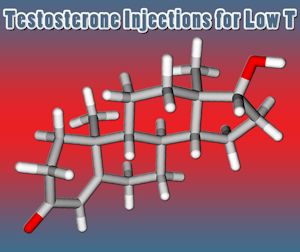Introduction
Testosterone, often associated with masculinity and physical prowess, plays a multifaceted role in the human body, particularly in American men. Beyond its well-known effects on muscle mass and libido, testosterone has a significant impact on immune function and disease resistance. This article explores the intricate relationship between testosterone levels and immune function, shedding light on how hormonal regulation can influence health outcomes in American men.
The Role of Testosterone in Immune Function
Testosterone, a primary male sex hormone, is produced predominantly in the testes and to a lesser extent in the adrenal glands. It is crucial not only for the development of male reproductive tissues but also for maintaining secondary sexual characteristics. However, its influence extends to the immune system, where it plays a pivotal role in regulating immune responses.
Research indicates that testosterone can modulate the immune system by affecting the production and activity of various immune cells, such as T cells and B cells. These cells are essential for identifying and combating pathogens. Studies have shown that optimal levels of testosterone can enhance immune function, thereby improving the body's ability to resist infections and diseases.
Testosterone Levels and Disease Resistance
The relationship between testosterone levels and disease resistance is complex and bidirectional. On one hand, adequate testosterone levels can bolster the immune system, making men more resilient to infections. On the other hand, excessively high or low levels of testosterone can lead to immune dysregulation, potentially increasing susceptibility to certain diseases.
For instance, research has demonstrated that men with lower testosterone levels may be at a higher risk of developing autoimmune disorders, such as rheumatoid arthritis. Conversely, elevated testosterone levels have been linked to a reduced risk of these conditions. This suggests that maintaining a balance in testosterone levels is crucial for optimal immune function and disease resistance.
Impact on Specific Health Conditions
Testosterone's influence on immune function has significant implications for various health conditions prevalent among American men. For example, cardiovascular diseases, a leading cause of death in this demographic, can be affected by testosterone levels. Studies have shown that men with lower testosterone levels are more likely to develop cardiovascular issues, possibly due to the hormone's role in maintaining vascular health and reducing inflammation.
Similarly, testosterone levels can impact the progression of certain cancers. Prostate cancer, a common concern for American men, has been associated with testosterone levels. While high levels of testosterone were once thought to increase the risk of prostate cancer, recent research suggests that the relationship is more nuanced, with testosterone potentially playing a protective role in some cases.
Hormonal Regulation and Health Management
Given the critical role of testosterone in immune function and disease resistance, managing hormonal levels is essential for maintaining overall health. American men can benefit from regular monitoring of their testosterone levels, especially as they age, as levels naturally decline with time.
Lifestyle factors such as diet, exercise, and stress management can significantly influence testosterone levels. A balanced diet rich in nutrients like zinc and vitamin D, regular physical activity, and adequate sleep can help maintain optimal testosterone levels. Additionally, men experiencing symptoms of low testosterone, such as fatigue, decreased libido, and mood changes, should consult healthcare professionals for appropriate interventions, which may include hormone replacement therapy.
Conclusion
Testosterone's role in immune function and disease resistance is a critical aspect of men's health that warrants further exploration and understanding. For American men, maintaining optimal testosterone levels can enhance immune function, reduce the risk of certain diseases, and improve overall quality of life. By adopting a proactive approach to hormonal regulation and health management, men can harness the benefits of testosterone to lead healthier, more resilient lives.
Contact Us Today For A Free Consultation

- Genetics and Testosterone: Interplay, Influences, and Personalized Health Strategies [Last Updated On: February 18th, 2025] [Originally Added On: February 18th, 2025]
- Stoking Man’s Mettle: An In-Depth Look at Testosterone [Last Updated On: February 25th, 2025] [Originally Added On: February 25th, 2025]
- Unraveling the Testosterone Enigma: Navigating the Masculine Hormone's Impact on Life [Last Updated On: February 26th, 2025] [Originally Added On: February 26th, 2025]
- Unraveling Spectrum: Transitioning Through the Testosterone Timeline [Last Updated On: February 27th, 2025] [Originally Added On: February 27th, 2025]
- Unveiling the Realm Beyond Muscles: Illuminating the Comprehensive Merits of Optimum Testosterone Levels [Last Updated On: February 28th, 2025] [Originally Added On: February 28th, 2025]
- Unraveling the Testosterone Narrative: Distinguishing Truths from Fallacies [Last Updated On: February 28th, 2025] [Originally Added On: February 28th, 2025]
- Unlocking Vitality and Vigor: Unfolding the Secrets of Testosterone [Last Updated On: March 1st, 2025] [Originally Added On: March 1st, 2025]
- Empowering the Androgenic Alchemy: Natural Diet Strategies to Amplify Testosterone Secretion [Last Updated On: March 2nd, 2025] [Originally Added On: March 2nd, 2025]
- Optimizing Testosterone Levels Through Exercise: Mechanisms, Effective Workouts, and Age-Related Impacts [Last Updated On: March 3rd, 2025] [Originally Added On: March 3rd, 2025]
- Impact of Testosterone on Mental Health and Cognitive Functions [Last Updated On: March 4th, 2025] [Originally Added On: March 4th, 2025]
- Understanding Testosterone's Role in Male Health and Development Across Lifespan [Last Updated On: March 5th, 2025] [Originally Added On: March 5th, 2025]
- Understanding Testosterone's Role in Male Health and Development Across the Lifespan [Last Updated On: March 6th, 2025] [Originally Added On: March 6th, 2025]
- Optimizing Testosterone Levels Naturally: Diet, Exercise, Sleep, Stress, and Lifestyle Strategies [Last Updated On: March 7th, 2025] [Originally Added On: March 7th, 2025]
- Advancements in Testosterone Therapy: Enhancing Men's Health and Quality of Life [Last Updated On: March 8th, 2025] [Originally Added On: March 8th, 2025]
- Optimizing Male Health: Managing Testosterone Decline for Vitality and Well-Being [Last Updated On: March 9th, 2025] [Originally Added On: March 9th, 2025]
- Testosterone's Vital Role in Women's Health: Insights for American Males [Last Updated On: March 11th, 2025] [Originally Added On: March 11th, 2025]
- Unlocking the Potential: The Future of Hormonal Health Through Testosterone Research [Last Updated On: March 12th, 2025] [Originally Added On: March 12th, 2025]
- The Nocturnal Boost: How Sleep Fuels Testosterone Production in American Men [Last Updated On: March 12th, 2025] [Originally Added On: March 12th, 2025]
- Navigating Hormonal Harmony: The Interplay of Stress, Cortisol, and Testosterone in American Men [Last Updated On: March 13th, 2025] [Originally Added On: March 13th, 2025]
- Unleashing Potential: The Role of Testosterone in Athletic Performance Among American Males [Last Updated On: March 15th, 2025] [Originally Added On: March 15th, 2025]
- Understanding and Managing Low Testosterone in American Men: Symptoms, Causes, and Treatments [Last Updated On: March 19th, 2025] [Originally Added On: March 19th, 2025]
- Testosterone Enhancement: Supplements, Natural Remedies, and Medical Interventions for American Males [Last Updated On: March 19th, 2025] [Originally Added On: March 19th, 2025]
- Testosterone's Impact on Cardiovascular Health in American Males: A Comprehensive Overview [Last Updated On: March 19th, 2025] [Originally Added On: March 19th, 2025]
- Testosterone's Role in Enhancing Workplace Productivity and Drive for American Males [Last Updated On: March 19th, 2025] [Originally Added On: March 19th, 2025]
- Environmental Toxins' Impact on Male Testosterone Levels and Health [Last Updated On: March 19th, 2025] [Originally Added On: March 19th, 2025]
- Testosterone's Impact on Mood, Memory, and Motivation in American Males [Last Updated On: March 19th, 2025] [Originally Added On: March 19th, 2025]
- Testosterone's Crucial Role in Immune Health for American Males [Last Updated On: March 20th, 2025] [Originally Added On: March 20th, 2025]
- Testosterone Revolution: Redefining Masculinity and Enhancing Men's Health in America [Last Updated On: March 21st, 2025] [Originally Added On: March 21st, 2025]
- Testosterone's Role in Bone Health: Strategies for American Males to Prevent Osteoporosis [Last Updated On: March 21st, 2025] [Originally Added On: March 21st, 2025]
- Testosterone's Role in Male Libido: Understanding and Enhancing Sexual Vitality [Last Updated On: March 21st, 2025] [Originally Added On: March 21st, 2025]
- Testosterone's Impact on Metabolism and Fat Burning in American Males [Last Updated On: March 21st, 2025] [Originally Added On: March 21st, 2025]
- Testosterone's Role in Muscle Recovery: Mechanisms and Optimization Strategies [Last Updated On: March 22nd, 2025] [Originally Added On: March 22nd, 2025]
- Resistance Training Boosts Testosterone: Benefits and Protocols for American Males [Last Updated On: March 22nd, 2025] [Originally Added On: March 22nd, 2025]
- Testosterone's Impact on Ambition and Competition in American Males [Last Updated On: March 23rd, 2025] [Originally Added On: March 23rd, 2025]
- Navigating Testosterone Concerns: Preparation, Communication, and Treatment Options with Your Doctor [Last Updated On: March 23rd, 2025] [Originally Added On: March 23rd, 2025]
- Testosterone and Sleep: Enhancing Health in American Males Through Better Sleep [Last Updated On: March 23rd, 2025] [Originally Added On: March 23rd, 2025]
- Urban vs. Rural Living: Impacts on Testosterone Levels in American Males [Last Updated On: March 24th, 2025] [Originally Added On: March 24th, 2025]
- Outdoor Activities Boost Testosterone: Nature's Impact on Men's Health [Last Updated On: March 24th, 2025] [Originally Added On: March 24th, 2025]
- Key Nutrients Boost Testosterone: Vitamin D, Zinc, Magnesium, B6 for American Males [Last Updated On: March 24th, 2025] [Originally Added On: March 24th, 2025]
- Meditation Boosts Testosterone: A Holistic Approach for American Males' Health [Last Updated On: March 24th, 2025] [Originally Added On: March 24th, 2025]
- Testosterone's Impact on Cognitive Function in American Males Across Age Groups [Last Updated On: March 24th, 2025] [Originally Added On: March 24th, 2025]
- Optimizing Testosterone: The Impact of Rest and Nutrition on American Males' Health [Last Updated On: March 24th, 2025] [Originally Added On: March 24th, 2025]
- Optimizing Testosterone: Nutrition, Exercise, Sleep, and Stress Management for American Men [Last Updated On: March 25th, 2025] [Originally Added On: March 25th, 2025]
- Boosting Testosterone: American Men's Guide to Positivity and Mental Health [Last Updated On: March 25th, 2025] [Originally Added On: March 25th, 2025]
- Hormonal Harmony: Testosterone's Interplay and Balance Strategies for American Males [Last Updated On: March 25th, 2025] [Originally Added On: March 25th, 2025]
- Testosterone Levels in American Men: Factors, Impacts, and Optimization Strategies [Last Updated On: March 25th, 2025] [Originally Added On: March 25th, 2025]
- Low Testosterone's Economic Impact: Healthcare Costs, Productivity, and Social Well-being in the U.S. [Last Updated On: March 25th, 2025] [Originally Added On: March 25th, 2025]
- Testosterone Tracking: Apps and Wearables Revolutionize Men's Health Monitoring [Last Updated On: March 25th, 2025] [Originally Added On: March 25th, 2025]
- Testosterone's Multifaceted Impact on American Men's Mental Health [Last Updated On: March 25th, 2025] [Originally Added On: March 25th, 2025]
- Testosterone's Vital Role in Cardiovascular Health for American Males [Last Updated On: March 25th, 2025] [Originally Added On: March 25th, 2025]
- Understanding Andropause: Symptoms, Testosterone's Role, and Management Strategies [Last Updated On: March 25th, 2025] [Originally Added On: March 25th, 2025]
- Social Dynamics and Testosterone Levels in American Males: A Comprehensive Analysis [Last Updated On: March 25th, 2025] [Originally Added On: March 25th, 2025]
- Boost Testosterone with Resistance Bands: A Home Workout Guide for Men [Last Updated On: March 26th, 2025] [Originally Added On: March 26th, 2025]
- Modern Diets and Testosterone: Insights for American Men's Health [Last Updated On: March 26th, 2025] [Originally Added On: March 26th, 2025]
- Testosterone's Influence on Risk-Taking in American Males: Neurobiological Insights [Last Updated On: March 26th, 2025] [Originally Added On: March 26th, 2025]
- Music and Art: Natural Boosters for Testosterone in American Males [Last Updated On: March 26th, 2025] [Originally Added On: March 26th, 2025]
- Revolutionizing Men's Health: Advances in Testosterone Optimization Technologies [Last Updated On: March 27th, 2025] [Originally Added On: March 27th, 2025]
- Testosterone's Role in Enhancing Mental Resilience Among American Males [Last Updated On: March 27th, 2025] [Originally Added On: March 27th, 2025]
- Testosterone Replacement Therapy: Benefits, Risks, and Realities for American Males [Last Updated On: March 27th, 2025] [Originally Added On: March 27th, 2025]
- Testosterone Management in American Males with Chronic Diseases: Insights and Strategies [Last Updated On: March 27th, 2025] [Originally Added On: March 27th, 2025]
- Intermittent Fasting: Boosting Testosterone and Health in American Males [Last Updated On: March 27th, 2025] [Originally Added On: March 27th, 2025]
- Testosterone and Athletic Performance: Myths, Facts, and Future Research for American Males [Last Updated On: March 27th, 2025] [Originally Added On: March 27th, 2025]
- Testosterone's Impact on Body Image and Self-Esteem in American Males [Last Updated On: March 27th, 2025] [Originally Added On: March 27th, 2025]
- Personalized Medicine Revolutionizes Testosterone Therapy for American Males [Last Updated On: March 27th, 2025] [Originally Added On: March 27th, 2025]
- Testosterone's Role in Longevity: Optimization and Therapy Insights [Last Updated On: March 28th, 2025] [Originally Added On: March 28th, 2025]
- Testosterone Health for American Males: Balancing Work and Wellness Strategies [Last Updated On: March 28th, 2025] [Originally Added On: March 28th, 2025]
- Declining Testosterone Levels in American Males: Trends, Causes, and Health Strategies [Last Updated On: March 28th, 2025] [Originally Added On: March 28th, 2025]
- Testosterone's Role in American Male Health: Understanding, Testing, and Treatment [Last Updated On: March 28th, 2025] [Originally Added On: March 28th, 2025]
- Testosterone Research: From Lab Discoveries to Clinical Impacts on American Men's Health [Last Updated On: March 29th, 2025] [Originally Added On: March 29th, 2025]
- Testosterone's Impact on Immune Health in American Men: Insights and Management Strategies [Last Updated On: March 30th, 2025] [Originally Added On: March 30th, 2025]
- Testosterone's Impact on Skin, Hair Health: A Guide for American Men [Last Updated On: March 30th, 2025] [Originally Added On: March 30th, 2025]
- Gut Health and Testosterone: Optimizing Hormonal Balance in American Males [Last Updated On: March 30th, 2025] [Originally Added On: March 30th, 2025]
- Body Composition's Impact on Testosterone Levels in American Males [Last Updated On: April 1st, 2025] [Originally Added On: April 1st, 2025]
- Testosterone's Crucial Role in Male Sexual Health and Well-being for American Men [Last Updated On: April 1st, 2025] [Originally Added On: April 1st, 2025]
- Alcohol and Smoking: Impact on Testosterone Levels in American Males [Last Updated On: April 2nd, 2025] [Originally Added On: April 2nd, 2025]
- Testosterone's Evolutionary Impact on Social Dominance in American Males [Last Updated On: April 6th, 2025] [Originally Added On: April 6th, 2025]
- Acupuncture: A Natural Approach to Balancing Testosterone in American Males [Last Updated On: April 7th, 2025] [Originally Added On: April 7th, 2025]
- Effective Strategies for American Men to Boost Testosterone Naturally and Safely [Last Updated On: April 9th, 2025] [Originally Added On: April 9th, 2025]
- Boost Testosterone Naturally: Mindful Living Practices for American Men [Last Updated On: April 9th, 2025] [Originally Added On: April 9th, 2025]
- HIIT Boosts Testosterone: Benefits and Practical Guide for American Males [Last Updated On: April 9th, 2025] [Originally Added On: April 9th, 2025]
Word Count: 608




















